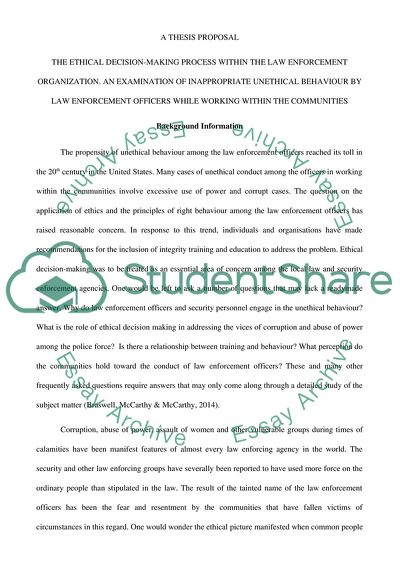Cite this document
(The Ethical Decision-Making Process within the Law Enforcement Organization Research Proposal Example | Topics and Well Written Essays - 1250 words - 1, n.d.)
The Ethical Decision-Making Process within the Law Enforcement Organization Research Proposal Example | Topics and Well Written Essays - 1250 words - 1. https://studentshare.org/ethics/1871397-the-ethical-decision-making-process-within-the-law-enforcement-organizationan-examination-of-inappropriate-unethical-behavior-from-law-enforcement-officers-while-working-within-the-communities
The Ethical Decision-Making Process within the Law Enforcement Organization Research Proposal Example | Topics and Well Written Essays - 1250 words - 1. https://studentshare.org/ethics/1871397-the-ethical-decision-making-process-within-the-law-enforcement-organizationan-examination-of-inappropriate-unethical-behavior-from-law-enforcement-officers-while-working-within-the-communities
(The Ethical Decision-Making Process Within the Law Enforcement Organization Research Proposal Example | Topics and Well Written Essays - 1250 Words - 1)
The Ethical Decision-Making Process Within the Law Enforcement Organization Research Proposal Example | Topics and Well Written Essays - 1250 Words - 1. https://studentshare.org/ethics/1871397-the-ethical-decision-making-process-within-the-law-enforcement-organizationan-examination-of-inappropriate-unethical-behavior-from-law-enforcement-officers-while-working-within-the-communities.
The Ethical Decision-Making Process Within the Law Enforcement Organization Research Proposal Example | Topics and Well Written Essays - 1250 Words - 1. https://studentshare.org/ethics/1871397-the-ethical-decision-making-process-within-the-law-enforcement-organizationan-examination-of-inappropriate-unethical-behavior-from-law-enforcement-officers-while-working-within-the-communities.
“The Ethical Decision-Making Process Within the Law Enforcement Organization Research Proposal Example | Topics and Well Written Essays - 1250 Words - 1”. https://studentshare.org/ethics/1871397-the-ethical-decision-making-process-within-the-law-enforcement-organizationan-examination-of-inappropriate-unethical-behavior-from-law-enforcement-officers-while-working-within-the-communities.


